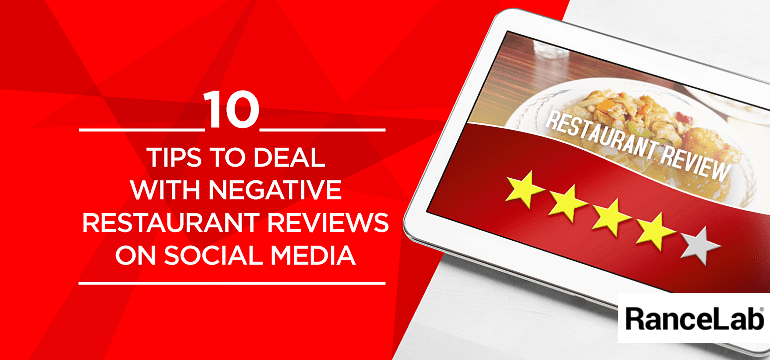Negative reviews about restaurants are usually the kind of stuff that nightmares are made of, for most restaurant owners. A single negative review can start a cascade of events that can ruin your reputation unless you decide to take control of the situation. Social media management is not for the faint-hearted; especially when a large number of people follow your restaurant on your social accounts, for people can be ruthless. Nobody wants a negative review, yet the situation seems out of our control. What could you possibly do? Here are some of the ways to deal with negative restaurant reviews on social media.
1. Always remember that the customer is the king
The customer could be right, and maybe wrong too, but he certainly is the king. Thanks to various social media tools, they get to say whatever they want, rightfully or not, and they wield power over your reputation and business success. The best thing to do is to assume the reviewer could be right even if you know they are not.
Read the reviews carefully multiple times and try to understand the tone of the reviewer. Try to comprehend if the reviewer is frustrated, upset, angry or is just a troll. The first step is to put yourself in their shoes before you respond, which requires empathy. Take time to collect your thoughts and be in the positive frame of mind.
2. Respond timely and promptly
Respond to the review within 24 hours and make it public. It’s one of the ways to show that you care and value their opinion. Take it as if you went through their own experience, this certainly indicates that you are paying attention to everything that your customer says. Use your customer’s feedback to generate content for your reply. Keep your promises and be honest. Restaurant POS tools often come with modules that notify you each time a review is published online, or even whenever there is a social conversation about your restaurant. Act immediately and promptly.
3. Acknowledge and apologize
If there has been any slip-up from your end, be honest and acknowledge swiftly to the customer and apologize. When you post a reply to the reviewer on social media, make sure your response is genuine.
Sometimes the problem is caused by your restaurant, and sometimes it isn’t. Take these negative reviews and work on those issues so that such incidents don’t happen in the future. If you are not at fault, figure out ways how you can further protect your restaurant from unfair reviews. Going an extra mile and treating your restaurant patrons with extra respect usually helps.
4. Delete when it’s necessary
Most people are not going to skip a restaurant because one person didn’t like their service. If there is a review which is too abhorrent, personal or odious, then don’t be afraid to contact the administrator of the site to put forward your case and get the review removed.
5. Personalize your responses
When some customers write a negative review about your restaurant, they are looking for you to acknowledge and resolve their problems. So when a customer reaches out to you to get a problem fixed, never respond with automated replies. Always respond back to the customer using a conversational tone, though the customer might be in a belligerent mood and is looking for trouble. Include the customer’s name in your response and let your customer know how you are going to fix the issue.
6. Take discussions offline
In certain situations, the issue needs additional details which you should not discuss in public, and it has to be discussed offline with the customer. Before you take the discussion offline be sure to reply or comment on the original review telling the user that you will contact them privately. This gives a clear indication that you aren’t neglecting the situation and you are taking a proactive approach to deal with the situation effectively.
7. Add some humor to your response
Dealing with negative reviews and complaints on social media with a touch of humor is one of the most effective ways to diffuse a tough situation. Avoid sarcasm when you reply, but use wittiness in your responses to lighten the air and make room for a calmer and peaceful discussion. If you have a theme-based restaurant, for example, a Japanese sushi bar, your reply could infuse something witty related to ninjas or Anime.
8. Handling Trolls
There are people looking for attention, escaping boredom, and looking for trouble. They gain energy by seeking responses on public social forums and are usually illicit and unrelated to your business. Their language is usually very strong and poignant. They are designed to make you react, and if you react, they win. Don’t provide them with oxygen, and don’t let them use your social media channels to vent their anger, or feed their attention. Instead, report them to the site admin, ignore them, or respond in a manner that conveys that you do not care, but politely.
9. Learn from your Critics
If you can use your bad reviews as a learning incident, they can serve as a medium for positive change in your operations. When bad reviews surface, not every employee has the mental capacity needed to see through the dark clouds of negativity. By gulping down your pride and making necessary amends based on the negative reviews you have received, you show that you have the pliability, patience, and determination to bounce back from the criticism that’s put on your way.
10. Don’t get personal
Social media is the easiest place for negative reviews and complaints to exist and persist. Most people who complain do so to give you an opportunity to resolve their issues. Most of the times, these people are your loyal customers, and a negative experience at your restaurant is unexpected for them. So, don’t take it to heart and do the best you can to validate their feedback, offer solutions, modify things going forward.
Conclusion
Restaurant business greatly relies on word-of-mouth marketing and it’s usually the best form of advertising. When people write negative reviews, they are simply seeking a resolution of what they think is a problematic situation. That should be easy to handle if you plan your strategy properly, and are genuinely interested in the well-being of both your restaurant and those who eat there. Even if a top-notch restaurant critic wrote bad reviews, just learn from the critic. As marketers say, all publicity is good publicity, and you might just be in luck.
Finally, remain alert to all kinds of feedback and reviews online by investing in a restaurant management software that is specifically geared towards bringing you all the buzz about you on social media.





Leave a Reply
You must be logged in to post a comment.